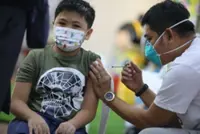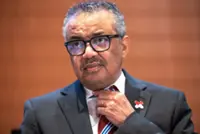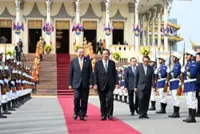In this file photo released by China's Xinhua News Agency, staff members work in an inflatable Covid-19 testing lab in 2020. The pandemic treaty offers the last, best chance to avoid repeating the mistakes made during the pandemic. — Xinhua/AP
WE are aware there will be new pandemics and major health emergencies at one time or another. We must therefore have a treaty on a joint organised response to a global health crisis that is legally binding under international law.
This treaty should prioritise the public interest and the balance between countries, must be anchored in the principles of fairness, inclusiveness and transparency, and guarantee universal and equitable access to diagnostics, vaccines and medicines.
Member states of the World Health Organisation met in Geneva in 2022 and agreed to develop an international agreement on pandemic prevention, preparation and response that would be “a legally binding pact between countries working together”.
A draft was developed after extensive consultation with member states, public health experts, academics and citizens. After various revisions, a new draft of the pandemic treaty was recently released to member states.
This new draft treaty was expected to lead to greater accountability from governments.
The Independent Panel for Pandemic Preparedness and Response recommends that pandemic governance should be led by heads of state to ensure it received political attention. But in the new text, treaty compliance oversight is lamentably left to the Third Committee of the World Health Assembly (WHA).
While all member states are represented on the committee, their representation mostly comprises health ministers, technocrats or diplomats that have little real influence over the actions of their governments in related sectors.
In the run-up to the WHA on May 24 to 31, which is slated to approve an agreement that until recently seemed like a done deal, differences between rich and poor countries, the distortion of geopolitical context and the greed driving interference of private interests threaten to shatter two years of negotiations and leave the multilateral system defenceless in the face of the next global pandemic.
A big part of the controversy surrounding the draft treaty stems from the false belief that it will sign over countries’ sovereignty to the WHO, giving that United Nations agency the power to dictate what countries should do during a pandemic. WHO Director General Tedros Adhanom Ghebreyesus warns that not agreeing the pandemic treaty is a potential failure for which future generations may not forgive us.
After 29 million deaths, generational trauma and multibillion-dollar debts we will be paying off for decades, the international community appears to have learned nothing from the Covid-19 pandemic.
The main challenges to agreeing the draft treaty are concentrated in two global health flashpoints: control of knowledge and sharing of resources. For countries in the Global South like Indonesia, passing the treaty will be possible only if rich countries facilitate the distribution of diagnostics, vaccines and medicines.
This also depends on responsive financing based on the principle of common but differentiated responsibilities (CBDR) that have been applied in other negotiations. From the perspective of the Global North and its influential pharmaceutical sector, reconsidering intellectual property rules seems taboo. The pandemic treaty could offer an opportunity to ensure that countries are equipped with the proper, principles-based mechanisms for cooperation to prevent the level of devastation wrought by the Covid-19 pandemic.
By failing to ground the treaty in existing human rights obligations and inadequately addressing human rights concerns that arise during public health emergencies, governments risk repeating history when the next global health crisis hits.
Governments must take steps to ensure that everyone can access the applications of scientific progress without discrimination, as human rights standards establish that scientific progress must be available, accessible, acceptable and of good quality to all individuals and communities.
During the Covid-19 pandemic, scientists began to design candidate vaccine viruses only a few hours after the first SARS-CoV2 genome sequence was shared.
The Global North promised to share vaccines through the WHO’s voluntary Covid-19 Vaccines Global Access (Covax) facility, but failed to meet their commitments.
Today, nearly one-third of the world’s population has not received a single dose of Covid-19 vaccines and the death toll resulting from vaccine nationalism continues to grow.
Across all fields, scientists from the Global North have often extracted data and samples from the Global South without the peoples’ permission and without providing any benefits to the countries where they work.
While the current draft treaty emphasises the importance of knowledge and technology transfer in delivering fair and timely access to diagnostics, vaccines and medicines, it fails to adequately ensure that governments protect the rights to these critical health products during an emergency in accordance with international human rights law and standards.
Instead, the draft uses weak language “encouraging” states to transfer knowledge and technology, diluting the obligations of governments to ensure that intellectual property rights do not constitute a barrier to the right to health and the right to benefit from scientific progress during a public health emergency.
The world is no closer to a fair system for sharing diagnostics, vaccines and medicines, and such barriers should be dismantled for lifesaving countermeasures.
Until that day arrives, however, the pandemic treaty offers the last, best chance to avoid repeating the mistakes made during the Covid-19 pandemic, enabling regions worldwide to produce vaccines and medicines instead of relying on promises of supplies from other nations, which understandably prioritise their population.
The complexity of the ongoing negotiations reflects the myriad challenges that must be addressed to effectively prevent, prepare for and respond to pandemics. These reforms must be guided by the principles of equity and solidarity.
The latest draft version of the treaty makes it very clear that the WHO seeks no new powers, authorities or control over all matters related to future pandemic response.
Political leadership is needed now to push the talks forward through the remaining issues. It is critical to seize this moment, which is not likely to come again soon if it does not happen this year. The world cannot afford to wait for the next pandemic to act. — The Jakarta Post
Daniel Tjen is a member of the World Health Organisation’s Health Security Interface-Technical Advisory Group.





